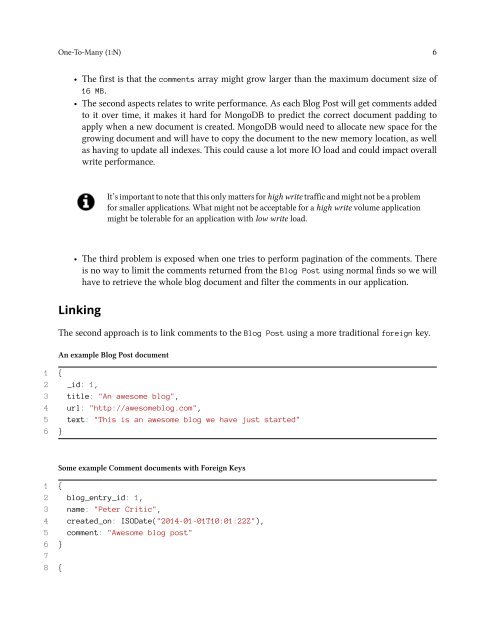The Little Mongo DB Schema Design Book
The Little Mongo DB Schema Design Book - Leanpub
The Little Mongo DB Schema Design Book - Leanpub
- No tags were found...
Create successful ePaper yourself
Turn your PDF publications into a flip-book with our unique Google optimized e-Paper software.
One-To-Many (1:N) 6<br />
• <strong>The</strong> first is that the comments array might grow larger than the maximum document size of<br />
16 MB.<br />
• <strong>The</strong> second aspects relates to write performance. As each Blog Post will get comments added<br />
to it over time, it makes it hard for <strong>Mongo</strong><strong>DB</strong> to predict the correct document padding to<br />
apply when a new document is created. <strong>Mongo</strong><strong>DB</strong> would need to allocate new space for the<br />
growing document and will have to copy the document to the new memory location, as well<br />
as having to update all indexes. This could cause a lot more IO load and could impact overall<br />
write performance.<br />
It’s important to note that this only matters for high write traffic and might not be a problem<br />
for smaller applications. What might not be acceptable for a high write volume application<br />
might be tolerable for an application with low write load.<br />
• <strong>The</strong> third problem is exposed when one tries to perform pagination of the comments. <strong>The</strong>re<br />
is no way to limit the comments returned from the Blog Post using normal finds so we will<br />
have to retrieve the whole blog document and filter the comments in our application.<br />
Linking<br />
<strong>The</strong> second approach is to link comments to the Blog Post using a more traditional foreign key.<br />
An example Blog Post document<br />
1 {<br />
2 _id: 1,<br />
3 title: "An awesome blog",<br />
4 url: "http://awesomeblog.com",<br />
5 text: "This is an awesome blog we have just started"<br />
6 }<br />
Some example Comment documents with Foreign Keys<br />
1 {<br />
2 blog_entry_id: 1,<br />
3 name: "Peter Critic",<br />
4 created_on: ISODate("2014-01-01T10:01:22Z"),<br />
5 comment: "Awesome blog post"<br />
6 }<br />
7<br />
8 {


